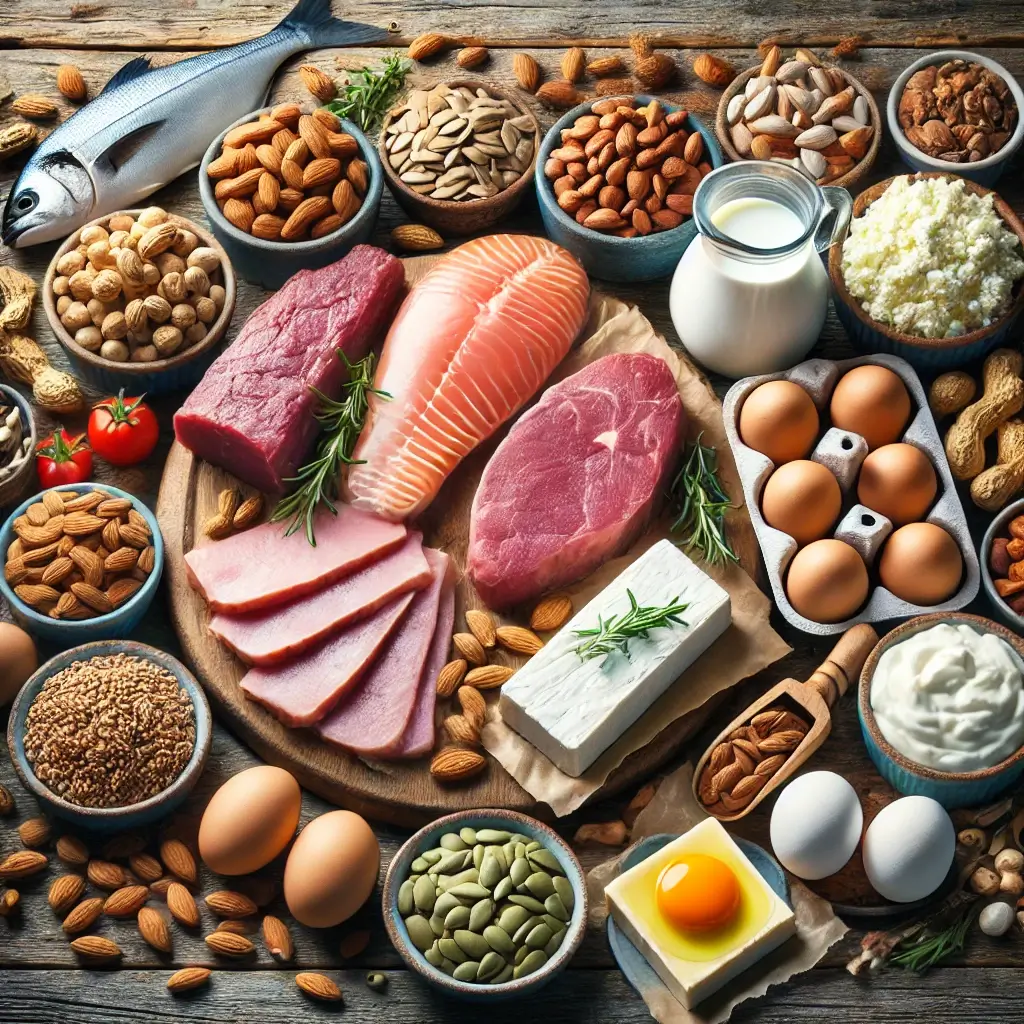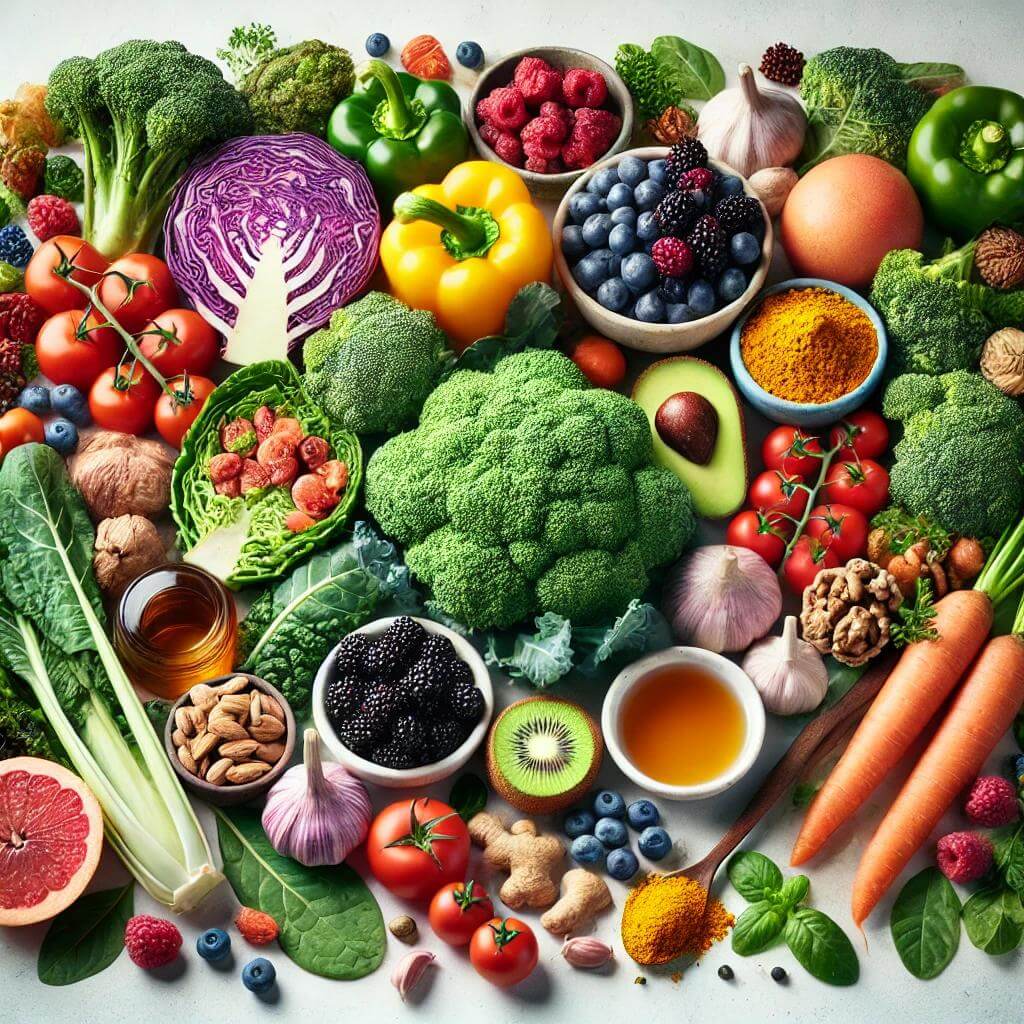The Top 15 Protein-Packed Foods You Need in Your Diet

Protein is one of the most crucial macronutrients in our diet, playing a pivotal role in muscle growth, tissue repair, hormone production, and overall bodily function. Adequate protein intake is essential for everyone, whether you’re an athlete aiming to build muscle, someone trying to lose weight, or simply focused on maintaining a healthy and balanced diet. High-protein foods provide not only the necessary building blocks for your body but also contribute to a feeling of fullness and satiety, which can help in weight management. This article will guide you through the top 15 foods with the highest protein content, detailing their nutritional benefits and how they can fit into your diet.
The 15 Foods with the Highest Protein Content
1. Chicken Breast
Chicken breast is often regarded as the gold standard for high-protein foods. It’s incredibly versatile, easy to prepare, and can be used in a wide variety of dishes. The high protein content, combined with its low fat, makes it a perfect choice for those looking to build muscle or lose weight.
- Protein Content: 31 grams per 100 grams
- Nutritional Benefits:
- Low in Saturated Fat: Chicken breast is lean meat, meaning it has very little fat, especially saturated fat, which is better for heart health.
- Rich in Essential Amino Acids: It provides all the essential amino acids required by the body, making it a complete protein source.
- High in Vitamins B6 and B12: These vitamins are crucial for energy metabolism and the proper functioning of the nervous system.
2. Tuna
Tuna is not only high in protein but also a fantastic source of omega-3 fatty acids, which are beneficial for heart health. It’s available in various forms, such as fresh, canned, or frozen, making it accessible and easy to incorporate into your diet.
- Protein Content: 30 grams per 100 grams
- Nutritional Benefits:
- Rich in Omega-3 Fatty Acids: Omega-3s are essential for reducing inflammation and promoting heart health.
- High in Vitamin D: Tuna is one of the few natural food sources of vitamin D, which is vital for bone health and immune function.
- Low in Carbohydrates: This makes it an excellent choice for low-carb diets.
3. Turkey Breast
Turkey breast is another lean meat that is high in protein. It’s especially popular during the holiday season but can be enjoyed year-round. Turkey is slightly leaner than chicken, with a similar protein content, making it a great alternative.
- Protein Content: 29 grams per 100 grams
- Nutritional Benefits:
- High in Selenium: Selenium is an antioxidant that plays a crucial role in maintaining a healthy immune system and supporting thyroid function.
- Contains Tryptophan: Tryptophan is an amino acid that helps in the production of serotonin, which can improve mood and aid in sleep.
- Low in Calories: Turkey breast is low in calories, which makes it ideal for those looking to lose weight without sacrificing protein intake.
4. Pork Loin
Pork loin is a lean cut of pork that is rich in protein and relatively low in fat. It’s a versatile meat that can be roasted, grilled, or sautéed, offering a tender and flavorful option for high-protein meals.
- Protein Content: 27 grams per 100 grams
- Nutritional Benefits:
- High in Thiamine (Vitamin B1): Thiamine is important for energy production and the metabolism of carbohydrates.
- Contains Selenium: Similar to turkey, pork loin is a good source of selenium, which supports thyroid function and protects against oxidative stress.
- Low in Saturated Fat: Despite being a red meat, pork loin is relatively low in saturated fat compared to other cuts.
5. Peanuts
Peanuts are one of the most protein-rich nuts available. They are a convenient and nutritious snack that can also be used in cooking or added to various dishes. Besides protein, peanuts provide healthy fats and fiber, making them a well-rounded food choice.
- Protein Content: 26 grams per 100 grams
- Nutritional Benefits:
- High in Unsaturated Fats: These fats are beneficial for heart health and can help reduce cholesterol levels.
- Rich in Magnesium: Magnesium is essential for muscle function, bone health, and maintaining stable blood sugar levels.
- Contains Resveratrol: This antioxidant is also found in red wine and has been linked to various health benefits, including improved heart health.
6. Beef
Beef is a rich source of complete protein, containing all the essential amino acids your body needs. It is a versatile meat that can be prepared in numerous ways, from grilling to slow-cooking. Depending on the cut, beef can vary in fat content, so it’s important to choose leaner cuts if you’re looking to reduce fat intake.
- Protein Content: 26 grams per 100 grams
- Nutritional Benefits:
- High in Iron and Zinc: Iron is essential for oxygen transport in the blood, while zinc is important for immune function and wound healing.
- Contains Vitamin B12: B12 is vital for red blood cell formation and neurological function.
- Supports Muscle Growth: Due to its high protein content, beef is excellent for muscle repair and growth, making it a staple in many athletes’ diets.
7. Sardines
Sardines are small, oily fish that pack a powerful nutritional punch. They are one of the most nutrient-dense foods available, providing not only a high amount of protein but also omega-3 fatty acids, vitamins, and minerals.
- Protein Content: 24 grams per 100 grams
- Nutritional Benefits:
- High in Calcium and Vitamin D: These nutrients are crucial for bone health, making sardines particularly beneficial for those at risk of osteoporosis.
- Rich in Omega-3 Fatty Acids: Like tuna, sardines are rich in omega-3s, which support heart health and reduce inflammation.
- Supports Heart Health: The combination of omega-3s, calcium, and vitamin D makes sardines a heart-healthy choice.
8. Almonds
Almonds are a popular snack that is high in protein, healthy fats, and fiber. They are also rich in antioxidants, making them a great choice for those looking to improve their overall health.
- Protein Content: 21 grams per 100 grams
- Nutritional Benefits:
- High in Vitamin E: Vitamin E is a powerful antioxidant that protects your cells from oxidative damage.
- Contains Magnesium: Magnesium is essential for many bodily functions, including muscle and nerve function, blood sugar control, and blood pressure regulation.
- Good Source of Fiber: The fiber in almonds helps promote digestive health and can aid in weight management by keeping you feeling full longer.
9. Tempeh
Tempeh is a fermented soy product that originates from Indonesia. It’s a staple in vegetarian and vegan diets due to its high protein content and the fact that it is a complete protein, containing all the essential amino acids.
- Protein Content: 20 grams per 100 grams
- Nutritional Benefits:
- Rich in Probiotics: The fermentation process increases the bioavailability of nutrients and introduces beneficial bacteria that support gut health.
- High in Fiber: Tempeh provides a good amount of dietary fiber, which supports digestive health and helps regulate blood sugar levels.
- Contains Vitamins B2 and B12: While B12 is usually found in animal products, some tempeh varieties are fortified with B12, making it a valuable nutrient source for vegetarians and vegans.
10. Pumpkin Seeds
Pumpkin seeds, also known as pepitas, are a nutrient-dense snack that provides a good amount of protein along with healthy fats, vitamins, and minerals. They can be eaten on their own, added to salads, or used in baking.
- Protein Content: 19 grams per 100 grams
- Nutritional Benefits:
- High in Magnesium: Magnesium is essential for many physiological functions, including nerve and muscle function, blood sugar control, and blood pressure regulation.
- Contains Zinc: Zinc is vital for immune function, protein synthesis, and wound healing.
- Rich in Antioxidants: Pumpkin seeds contain antioxidants like carotenoids and vitamin E, which help reduce inflammation and protect cells from damage.
11. Chickpeas
Chickpeas, also known as garbanzo beans, are a versatile legume that is high in protein and fiber. They can be used in a variety of dishes, from salads to soups to hummus.
- Protein Content: 19 grams per 100 grams
- Nutritional Benefits:
- High in Fiber: The fiber in chickpeas helps support digestive health and can aid in controlling blood sugar levels.
- Rich in Iron: Iron is essential for the production of hemoglobin, which transports oxygen in the blood.
- Contains Folate: Folate is important for cell function and tissue growth, making it especially important during pregnancy.
12. Cottage Cheese
Cottage cheese is a dairy product that is high in protein and low in fat. It’s particularly popular among athletes and bodybuilders for its slow-digesting casein protein, which provides a steady supply of amino acids to the muscles.
- Protein Content: 11 grams per 100 grams
- Nutritional Benefits:
- High in Casein Protein: Casein is a slow-digesting protein that helps sustain muscle repair and growth over time, especially beneficial when consumed before bed.
- Contains Riboflavin (Vitamin B2): Riboflavin helps convert food into energy and plays a vital role in maintaining healthy skin, eyes, and nervous system.
- Low in Lactose: Cottage cheese is lower in lactose compared to other dairy products, making it easier to digest for those with mild lactose intolerance.
13. Greek Yogurt
Greek yogurt is thicker and creamier than regular yogurt due to the straining process that removes much of the whey, resulting in a product that’s higher in protein and lower in sugar.
- Protein Content: 10 grams per 100 grams
- Nutritional Benefits:
- High in Probiotics: Greek yogurt contains live cultures that support a healthy gut microbiome, which is crucial for digestion and overall health.
- Rich in Calcium: Calcium is essential for maintaining strong bones and teeth and also plays a role in nerve function, muscle contraction, and blood clotting.
- Contains CLA (Conjugated Linoleic Acid): CLA is a fatty acid found in dairy products that may help reduce body fat and improve immune function.
14. Eggs
Eggs are one of the most nutrient-dense foods available, providing a complete source of protein along with essential vitamins and minerals. They are incredibly versatile and can be prepared in countless ways, making them a staple in many diets.
- Protein Content: 13 grams per 100 grams (2 large eggs)
- Nutritional Benefits:
- High in Choline: Choline is important for brain health, helping with memory and cognitive function, and is also crucial during pregnancy for fetal brain development.
- Contains Antioxidants: Eggs are rich in lutein and zeaxanthin, antioxidants that are beneficial for eye health and can help reduce the risk of cataracts and age-related macular degeneration.
- Supports Muscle and Bone Health: The protein in eggs, along with vitamin D, helps maintain muscle mass and bone strength.
15. Tofu
Tofu, also known as bean curd, is a popular plant-based protein source made from soybeans. It’s particularly favored in vegetarian and vegan diets as it provides all nine essential amino acids.
- Protein Content: 8 grams per 100 grams
- Nutritional Benefits:
- Complete Protein: Tofu is one of the few plant-based foods that is a complete protein, containing all the essential amino acids your body needs.
- High in Iron and Calcium: These minerals are important for maintaining strong bones and preventing anemia.
- Low in Calories: Tofu is low in calories, making it an excellent choice for weight management while still providing a significant amount of protein.
Summary Table of High-Protein Foods (Sorted in Descending Order)
| Food Type | Protein Content (per 100 grams) |
|---|---|
| Chicken Breast | 31 grams |
| Tuna | 30 grams |
| Turkey Breast | 29 grams |
| Pork Loin | 27 grams |
| Peanuts | 26 grams |
| Beef | 26 grams |
| Sardines | 24 grams |
| Almonds | 21 grams |
| Tempeh | 20 grams |
| Pumpkin Seeds | 19 grams |
| Chickpeas | 19 grams |
| Cottage Cheese | 11 grams |
| Greek Yogurt | 10 grams |
| Eggs | 13 grams |
| Tofu | 8 grams |
Conclusion
Incorporating high-protein foods into your diet is essential for achieving your health and fitness goals. These 15 foods, ranked by their protein content, offer a variety of options to suit different tastes and dietary preferences. Whether you’re an omnivore, vegetarian, or vegan, there are plenty of high-protein choices available to help you meet your nutritional needs. By including these foods in your meals, you can ensure that your body gets the protein it needs to function optimally, whether you’re building muscle, losing weight, or simply maintaining your health.
*Disclaimer: The information provided in this article is for educational and informational purposes only and should not be construed as health advice. The content is solely the personal opinion of the author and is not intended to be a substitute for professional medical advice, diagnosis, or treatment. Always seek the advice of your physician or other qualified health provider with any questions you may have regarding a medical condition or before starting any new diet or treatment. Read more



Post Comment